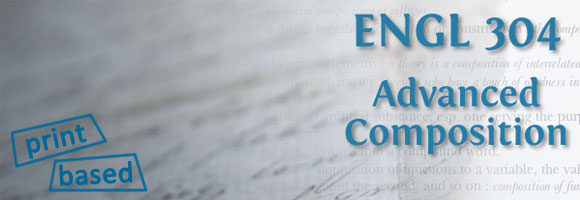
Course Outline
- Ten assignments
- Online component
- Final examination
Course Description
Student Profile
Elke Hutton, 4th year Psychology and Philosophy student

“I have discovered my love for writing, a purpose and a career as a writer…all because of the distance education format.”
This course approaches the study of writing with a focus on audience, authorial voice, and style. It emphasizes the writing process and the rhetorical concerns and principles—matters, for example, of genre, context, and intention—which govern that process. Internet access is required.
Intended Student
Students may register in English 304 if they have completed six credits of first-year English (or equivalent credits as recognized by UBC) and if they have completed at least sixty credits toward their undergraduate degree. English 304 is included among courses available to Majors students in both the Literature and Language Emphasis programs. English 304 is one of the Composition courses recommended for students planning to enter the post-degree program in the Faculty of Education.
Note: This course does not focus on grammar or on basic skills of composition. It assumes competence in these areas, and takes up strategies for making writing especially effective.
Course Objectives
The primary goal of this course is to turn good writers into very good or excellent ones. Its model is the writing workshop, in which students compose, revise, consult, and revise again — and in which students reflect on their writing. As a 304 student, you will receive commentary on your work not only from your instructor, but also from other students, and you will reflect on your writing not only formally (in one course assignment, for example), but also informally (in journal entries and exchanges with the instructor).
Other course objectives facilitate and enable this primary one. When you complete the course successfully, you will be able to do the following:
- Write essays more confidently in a variety of academic genres
- Use research to deepen any writing assignment, with an understanding of how research is accomplished and how source material is deployed in essays
- Demonstrate an ability to use the principles of rhetoric – principles of effective and persuasive composition for both writing and reading a variety of texts
- Read your own compositions analytically and critically, and use revision strategies effectively
Course Overview
The thirteen lessons of English 304 are designed and organized to increase your awareness of, and control over, your writing process, and to develop your composition skills—widely defined—in the context of a variety of writing tasks from journal entries to formal essays.
In Lesson One, you will have the opportunity to examine your own past essays and to use these to consider your writing strengths and weaknesses and to set goals for the current course. Lesson Two focuses on strategies for discovering the material that becomes the substance of essays; it also introduces some basic concepts in rhetorical study. Lesson Three begins the first essay assignment, which is folded into a discussion of description as a means of persuasion. Persuasion—and a theory of persuasion—is the subject of Lesson Four, which introduces many of the key terms of classical rhetoric. Lesson Five continues the work of Lesson Four, and prepares you to write the second assignment—a persuasive essay. The third assignment is introduced in Lesson Six, a lesson which adds to your rhetorical vocabulary terms for understanding and describing logical fallacies and features of style. This assignment, a rhetorical analysis, is the focus of Lesson Seven. Your developing skills as a rhetorical analyst are extended in Lesson Eight, which directs your attention to the rhetoric of academic disciplines. In this lesson and in Lesson Nine, you are asked to consider the ways in which the very texts that make up fields of study like history or anthropology or English literature are, in fact, persuasive in a number of ways and to a number of ends. The fourth assignment is a rhetorical analysis of disciplinary writing. Lessons Ten and Eleven shift the ground of the course a bit and begin the process of helping you apply your developing understanding of composition to the project of analyzing your own style (the work of the fifth assignment). The final two lessons of the course—Twelve and Thirteen—combine theory and practice, reading and writing, and research and reflection (as they’ve all been presented in the course) to help you produce, as Assignment Six, a research essay.
Course Materials
You will need access to a computer with an Internet connection to complete the course as it is designed. The on-campus version of English 304 relies heavily on the concept of the writers’ workshop. An effective way to compensate in the current course for the lack of face-to-face work between instructor and student and among students themselves is to take advantage of some of the many possibilities for electronic conversations and interactions:
- You will communicate directly with the instructor by e-mail, and submit essays and journal entries electronically. (The instructor will respond directly on the essays, posing questions, suggesting directions for revision, and referring students to the Handbook for specific help.)
- An electronic “bulletin board” will allow students proceeding through the course at comparable rates to work collaboratively, especially when revision of drafts is called for. It will also allow students to send messages to, and receive messages from, all other registered students, as well as the instructor, and will allow for online discussion of matters of interest. For example, a student who is concerned that “rhetoric” is a means of manipulation may well begin a discussion thread on
the ethics of rhetorical instruction.
Evaluation
You will write six essays and a final examination in ENGL 304. You will, in addition, maintain a journal. Your course grade consists of the following:
| First Assignment | 5% |
| Five Assignments (@10% each) | 50% |
| The Journal (four submissions at 3% each) | 12% |
| Participation in electronic workshopping and conferencing | 10% |
| Final Exam | 23% |
| Total | 100% |
Required Textbooks/Materials
- Crowley, Sharon and Debra Hawhee. Ancient Rhetorics for Contemporary Students. 4th ed. Pearson Longman, 2008.
- Fowler, H. Ramsey, Jane E. Aaron and Murray McArthur. The Little, Brown Handbook. 6th Can. ed. (Pkg. with MyCanadianCompLab access) Pearson Longman, 2008.
- ENGL 304 Learner Package (includes course manual)
